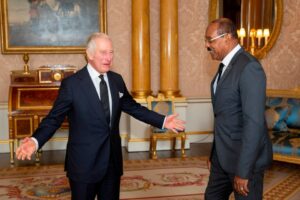The BBC emphasizes the authenticity of its findings on child trafficking in Kenya, despite allegations from government officials questioning the legitimacy of their documentary.
BBC Stands Firm on Kenya Child Trafficking Investigation Amid Accusations of Fraud

BBC Stands Firm on Kenya Child Trafficking Investigation Amid Accusations of Fraud
BBC defends its investigation into child sexual trafficking in Kenya, dismissing government claims of it being a 'hoax.'
In a response to accusations from Kenyan government officials, the BBC has staunchly defended its investigation into child sexual exploitation and trafficking in the country. Interior Minister Kipchumba Murkomen criticized the documentary during a parliamentary session, labeling it a "hoax" and asserting that the individuals interviewed were not minors, but rather acting as adults. He claimed these individuals were "posing as children," which the BBC contested, clarifying that the documentary explicitly indicated they were adults sharing experiences of abuse from their childhood.
The BBC maintained that the Africa Eye investigation is a vital component of public interest journalism and entirely transparent. Contrary to Murkomen's assertions, the BBC declared that no financial incentives were provided to the individuals featured in the documentary to share their experiences. The broadcaster further highlighted its commitment to child safety, revealing that evidence collected during the investigation was submitted to Kenyan authorities back in March, and they had received assurances of impending action to safeguard vulnerable children.
In his defense of the Kenyan government's efforts to protect children, Murkomen stated that cases of child trafficking are taken seriously. However, criticism continued from other government figures, including the Speaker of the National Assembly, Moses Wetang'ula, who accused the BBC of attempting to tarnish Kenya’s image through the documentary.
The controversial film, released on August 4, has attracted over a million views on YouTube, showcasing alarming accounts of underage girls, some as young as 13, being trafficked for sex in Maai Mahiu, a transit hub in Kenya's Rift Valley. The documentary includes testimonies from women who admitted to deliberately trafficking minors, indicating a grim reality where prostitution has become a normalized practice in the area.
The BBC's findings led to calls for an investigation by the Office of the Director of Public Prosecutions to be initiated against the accused. However, there is growing concern regarding how the survivors were interviewed by the Directorate of Criminal Investigations without legal representation. The two individuals implicated in the investigation have yet to be captured by law enforcement, as Murkomen mentioned that they have not been located.
This controversy underscores the challenges surrounding child trafficking in Kenya and the ongoing struggles faced by those aiming to address these systemic issues. The BBC continues to advocate for transparency and accountability in these serious matters, emphasizing the importance of protecting children's rights and well-being.
The BBC maintained that the Africa Eye investigation is a vital component of public interest journalism and entirely transparent. Contrary to Murkomen's assertions, the BBC declared that no financial incentives were provided to the individuals featured in the documentary to share their experiences. The broadcaster further highlighted its commitment to child safety, revealing that evidence collected during the investigation was submitted to Kenyan authorities back in March, and they had received assurances of impending action to safeguard vulnerable children.
In his defense of the Kenyan government's efforts to protect children, Murkomen stated that cases of child trafficking are taken seriously. However, criticism continued from other government figures, including the Speaker of the National Assembly, Moses Wetang'ula, who accused the BBC of attempting to tarnish Kenya’s image through the documentary.
The controversial film, released on August 4, has attracted over a million views on YouTube, showcasing alarming accounts of underage girls, some as young as 13, being trafficked for sex in Maai Mahiu, a transit hub in Kenya's Rift Valley. The documentary includes testimonies from women who admitted to deliberately trafficking minors, indicating a grim reality where prostitution has become a normalized practice in the area.
The BBC's findings led to calls for an investigation by the Office of the Director of Public Prosecutions to be initiated against the accused. However, there is growing concern regarding how the survivors were interviewed by the Directorate of Criminal Investigations without legal representation. The two individuals implicated in the investigation have yet to be captured by law enforcement, as Murkomen mentioned that they have not been located.
This controversy underscores the challenges surrounding child trafficking in Kenya and the ongoing struggles faced by those aiming to address these systemic issues. The BBC continues to advocate for transparency and accountability in these serious matters, emphasizing the importance of protecting children's rights and well-being.


















